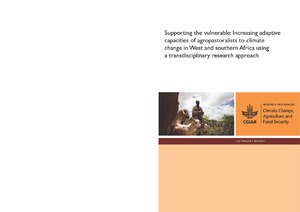Resource information
The world’s climate is changing rapidly and Africa will be severely affected by this, not only because of the effects on ecosystems but also because of the low adaptive capacity of communities due to poverty and lack of infrastructure, services, and appropriate policies to support adaptation strategies. A large share of Africa’s poor are dependent on livestock for some part of their livelihoods, most of these living in smallholder, rainfed mixed systems and pastoral systems, where livestock play a key role as assets providing multiple economic, social, and risk management functions. The goal of this transdisciplinary project is to increase the adaptive capacity of agropastoralists, who are one of the most vulnerable groups in Africa, to climate change and variability. The purpose of this project is to co-generate methods, information and solutions between local communities, local and international scientists, policymakers and other actors involved in climate change and adaptation programs, for coping mechanisms and adapting strategies to climate change and variability in West and Southern Africa, and more particularly in Mali and Mozambique. To quantify the magnitudes of the effects of climate variability and change on the productivity of rangelands, crops and livestock and how these changes affect agropastoralists, spatial data layers were created, collated and documented related to climate variability and change, production systems, primary production, vulnerability and feed resources. First a generalized downscaling and data generation method was used to take the outputs of a General Circulation Models (GCM) to describe some future climatology and to allow the stochastic generation of daily weather data that are to some extent characteristic of this future climatology, that can then be used to drive impact models that require daily (or otherwise aggregated) weather data. Secondly a global livestock production system classification scheme that integrates the notions of crop and livestock interactions with agro-ecological zones was extended by including indicators of the major crops grown in the mixed crop–livestock areas. Next a dynamic global vegetation crop model was used for simulating crop and rangeland yields, water and carbon fluxes and water productivities under different climate and land use scenarios. Areas of reduced primary productivity were identified and characterized and overlaid with information on poverty and livelihoods, to identify hotspots where productivity reductions may have serious repercussions on smallholders’ wellbeing. Communities have been adapting to change and variability for centuries. Household surveys and in-depth narrative analyses were conducted with agropastoral communities to document, synthesise and help disseminate their past and present coping mechanisms and adaptation strategies, particularly those related to livestock, for which there is relatively little information. Several institutions are already working on promoting adaptation strategies in West and Southern Africa. We collated and documented the strategies promoted, and together with the indigenous information provided by agropastoralist communities we initiated dialogues between the different stakeholders to jointly prioritize adaptation strategies, to select a few for pilot testing. By doing this we can provide active learning opportunities and promote the co-creation of adaptation options between different stakeholders. Implementation and dissemination of technical adaptation options often fails due to the lack of support from the policy environment. Together with key policymaking institutions and regional policymaking bodies we identified and promoted policy entry points to support the implementation of priority adaptation strategies, and we identified policy mechanisms that in themselves are an appropriate intervention to allow agropastoralists to buffer the effects of climate variability and change.



